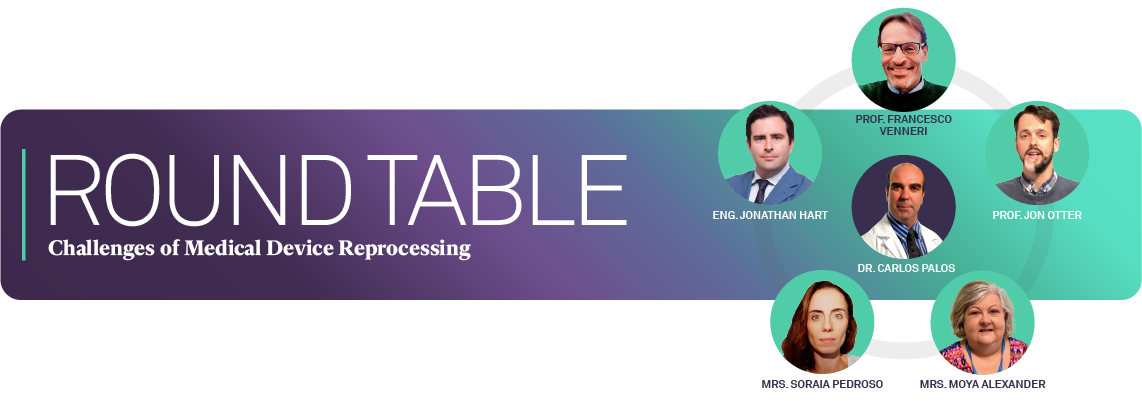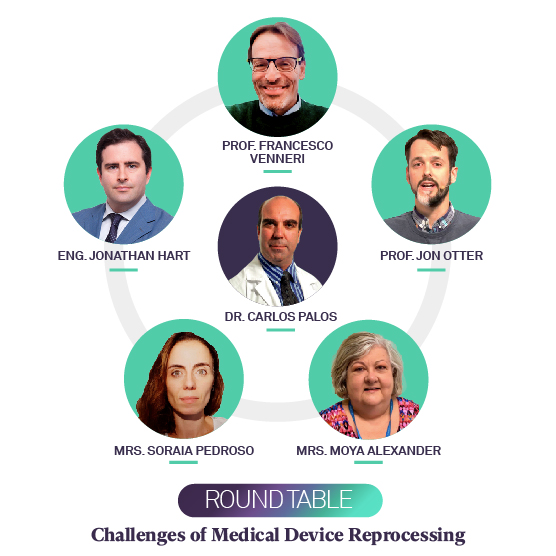- /
- ASP Web Summit
- /
- Webinars Series #2 – Challenges...
ASP 2021 Webinar series on “Challenges of Medical Devices Reprocessing”
General Announcement
Every day, millions of surgeries are done throughout the World. Surgical Site Infections (SSIs) can complicate any type of surgery and are among the most prevalent healthcare associated infections (HAI)1. According to the ECDC, 18,3% of all HAIs in Europe are SSIs.2
SSIs are also among the most preventable Healthcare Associated Infections (HAIs), requiring interventions in several moments of the patient stay.1 The consequences of SSI are very broad: morbidity, mortality and costs are increased.1,3
According to the last ECRI report, device cleaning, disinfection, and sterilization are on the top 10 of Patient Safety Concerns.8
Its success is dependent on a deep commitment of several facilities departments and healthcare workers.12
By Dr. Carlos Palos
SCIENTIFIC DIRECTOR

Prof. Francesco Venneri

Prof. Jon Otter

Mrs. Moya Alexander

Mrs. Soraia Pedroso

Eng. Jonathan Hart

INFECTION CONTROL & ANTIMICROBIAL STEWARDSHIP
LISBON, PORTUGAL

Prof. Francesco Venneri
Clinical Risk Manager and Patient Safety Officer
Florence Healthcare System, Italy
SYNOPSIS:
A brief survey of the “art” of reprocessing recalling its history and background through guidelines on a national and international basis. A focus on reprocessing as part of the concept of patient safety and risk management principles towards the goal of reducing HAIs correlated to inadequate procedures.

QUESTIONS:
- How strategic are guidelines in medicine practice and patient safety?
- What is the importance of medical devices reprocessing to ensure the reduction of SSIs?
- How important are reprocessing and risk management in order to implement Patient Safety?

Prof. Jon Otter
Honorary Senior Lecturer in HCAI AMR
Imperial College London
SYNOPSIS:
This webinar will provide an overview of HAI associated with medical device reprocessing, including a summary of the epidemiology of HAI related to medical device reprocessing failure. Past failures in medical device reprocessing will be reviewed to promote safer systems to prevent HAI from medical device reprocessing in the future.

QUESTIONS:
- What are the key HAI risks and control points in the medical device reprocessing process?
- What are the most common failures related to medical device reprocessing that have led to HAI?
- What can we change to improve existing systems to make medical device reprocessing simpler?

Mrs. Moya Alexander
Decontamination Lead
Imperial College Healthcare NHS Trust
SYNOPSIS:
Minimally invasive surgery which includes both laparoscopic and robotic surgery has brought new challenges with regards the reprocessing of medical devices. Most of these instruments are not designed to be disassembled for cleaning, disinfection, and sterilization.

QUESTIONS:
- What are the key challenges related with robotic and laparoscopic medical device reprocessing?
- What are the relations between robotic and laparoscopic medical device reprocessing and SSIs?
- What can we change to improve robotic and laparoscopic medical device reprocessing?

Mrs. Soraia Pedroso
Clinical Nurse Specialist/ Lead Infection Prevention and Control
Nurse at Hospital Beatriz Ângelo, Lisbon
SYNOPSIS:
The outbreaks with duodenoscopes identified in the beginning of this last decade have brought a big and real concern regarding the flexible endoscopes reprocessing since most of those instruments are complex to be proper cleaning. Besides the question is now if we should just high level disinfect them or sterilize them?

QUESTIONS:
- Could endoscopes be the source of gram negative multi resistant outbreaks in hospitals?
- What are the different types of tests to monitor the reprocessing efficacy? Are they enough?
- Which are the solutions to address the flexible scopes reprocessing issue? How efficient are they?

Eng. Jonathan Hart
Head of Technological Innovation and Health Technology Assessment
Campus Bio-Medico University Hospital, Rome
SYNOPSIS:
This webinar will provide an overview on the role played by Health Technology Assessment (HTA) in a multidimensional approach to planning, managing and improving the MD reprocessing cycle, contributing to higher quality standards and enhance Patient Safety.

QUESTIONS:
- What is Heath Technology Assessment (HTA) and how important is for the healthcare institutions?
- How critical is the HTA role on the reprocessing cycle and how can HTA contribute for the Quality?
- How important is HTA to guarantee the process efficiency and effectiveness and Patient Safety?
References :
1. Global guidelines for the prevention of surgical site infection, second edition. Geneva: World Health Organization; 2018. (pag.27 3.1 Surgical site infection risk factors: epidemiology and burden worldwide). https://www.who.int/gpsc/ssi-prevention-guidelines/en/
2. Prevalence of healthcare-associated infections, estimated incidence and composite antimicrobial resistance index in acute care hospitals and long-term care facilities: results from two European point prevalence surveys, 2016 to 2017 (Pag. 7, Table 3) https://www.eurosurveillance.org/content/10.2807/1560-7917.ES.2018.23.46.1800516
3. Badia, J. M., Casey, A. L., Petrosillo, N., Hudson, P. M., Mitchell, S. A., & Crosby, C. (2017). Impact of surgical site infection on healthcare costs and patient outcomes: a systematic review in six European countries. The Journal of hospital infection, 96(1), 1–15. https://doi.org/10.1016/j.jhin.2017.03.004
4. Gandaglia, G., Ghani, K. R., Sood, A., Meyers, J. R., Sammon, J. D., Schmid, M., Varda, B., Briganti, A., Montorsi, F., Sun, M., Menon, M., Kibel, A. S., & Trinh, Q. D. (2014). Effect of minimally invasive surgery on the risk for surgical site infections: results from the National Surgical Quality Improvement Program (NSQIP) Database. JAMA surgery, 149(10), 1039–1044. https://doi.org/10.1001/jamasurg.2014.292
5. Hermsen, E. D., Hinze, T., Sayles, H., Sholtz, L., & Rupp, M. E. (2010). Incidence of surgical site infection associated with robotic surgery. Infection control and hospital epidemiology, 31(8), 822–827. https://doi.org/10.1086/654006
6. Ofstead, C. L., Buro, B. L., Hopkins, K. M., Eiland, J. E., Wetzler, H. P., & Lichtenstein, D. R. (2020). Duodenoscope-associated infection prevention: A call for evidence-based decision making. Endoscopy international open, 8(12), E1769–E1781. https://doi.org/10.1055/a-1264-7173
7. Scoping the problem – endoscopy associated infections – The Lancet Gastroenterology & Hepatology (www.thelancet.com/gastrohep Vol 3 July 2018)
8. Special Report Top 10 Patient Safety 2020 – Executive-Brief, ECRI, page 9, 5. Device Cleaning, Disinfection, and Sterilization. https://www.ecri.org/landing-top-10-patient-safety-concerns-2020
9. Dancer, S. J., Stewart, M., Coulombe, C., Gregori, A., & Virdi, M. (2012). Surgical site infections linked to contaminated surgical instruments. The Journal of hospital infection, 81(4), 231–238. https://doi.org/10.1016/j.jhin.2012.04.023. Journal Hosp Infection 2012 Aug;81(4):231-8. doi: 10.1016/j.jhin.2012.04.023. Epub 2012 Jun 15.
10. Southworth P. M. (2014). Infections and exposures: reported incidents associated with unsuccessful decontamination of reusable surgical instruments. The Journal of hospital infection, 88(3), 127–131. https://doi.org/10.1016/j.jhin.2014.08.007
11. Tosh, P. K., Disbot, M., Duffy, J. M., Boom, M. L., Heseltine, G., Srinivasan, A., Gould, C. V., & Berríos-Torres, S. I. (2011). Outbreak of Pseudomonas aeruginosa surgical site infections after arthroscopic procedures: Texas, 2009. Infection control and hospital epidemiology, 32(12), 1179–1186. https://doi.org/10.1086/662712
12. WHO Library Cataloguing-in-Publication Data Decontamination and reprocessing of medical devices for health-care facilities. (pag.12 – Introduction; pag.14 Quality Assurance) https://www.who.int/infection-prevention/publications/decontamination/en/








